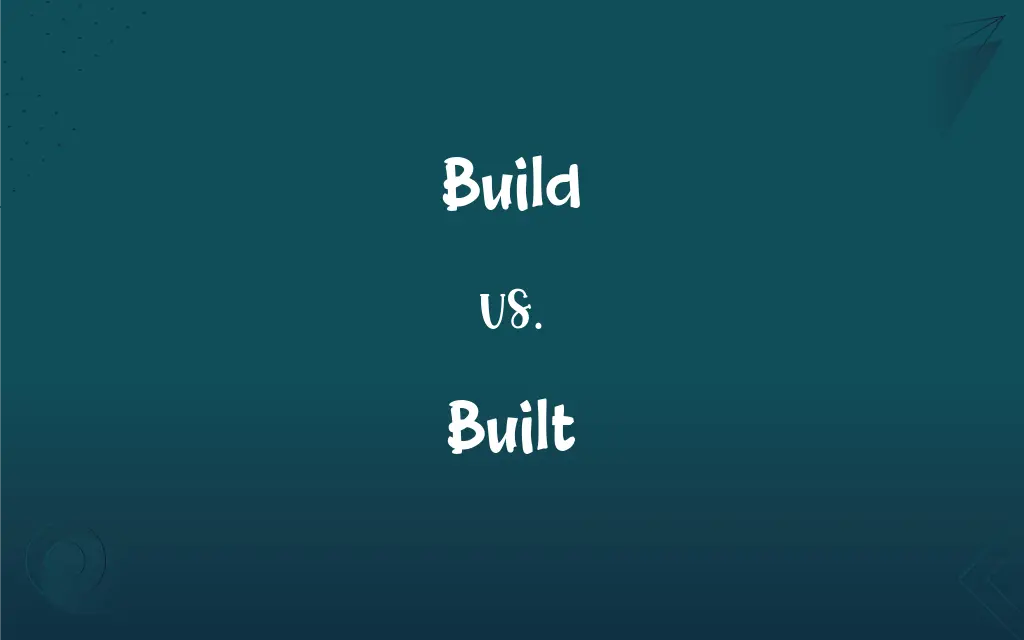Build vs. Built: What's the Difference?
Edited by Janet White || By Harlon Moss || Updated on October 3, 2023
"Build" is the present tense verb describing the act of constructing, while "built" is the past tense and past participle form, indicating the construction has occurred.

Key Differences
"Build" and "built" are two verbal forms that communicate the activity or status of construction, differentiated primarily by tense. "Build" pertains to the action in a general or future-oriented sense, indicating ongoing or forthcoming construction activity. Contrarily, "built" affirms that the construction action has been completed in the past, providing a finalized or historical context.
In exploring "build", it’s essential to note its application in discussing or planning construction or development. "Build" inherently carries a forward-looking or continuous implication, suggesting that the act of building is either currently occurring or will occur in the future. Conversely, "built" aligns with a backward-looking perspective, confirming an action that has already taken place.
Envisage a scenario where someone is constructing a house. If they say, “I will build a house,” it introduces an intention or plan, implicating a future action. If they state, “I built a house,” it implies the action is complete and the house has been constructed in the past. Thus, “build” anticipates or is in the midst of action, while “built” confirms and looks back on the action.
The usage of "build" could also suggest an ongoing, present action, such as in “I build houses,” which may imply this is what the speaker does, perhaps as a profession. In contrast, “built” would not be suitable in this context as it cannot imply an ongoing action due to its past tense nature, affirming only what has occurred and not what continues to occur.
“Build” and “built” thus stand as markers of temporal context, anchoring actions in time by indicating either anticipation and continuity with “build”, or completion and pastness with “built”, each enabling communication of construction activities across various time frames and contexts.
ADVERTISEMENT
Comparison Chart
Tense
Present
Past
Indication of Time
Current/Future
Past
Grammatical Role
Base form
Past tense & past participle
Usage in Continuous Form
Can be used (e.g., is building)
Cannot be used
Connotation
Ongoing or planned activity
Completed activity
ADVERTISEMENT
Build and Built Definitions
Build
To construct by combining materials and parts.
They plan to build a new school.
Built
Formed or shaped in the past.
The statue was built by a renowned artist.
Build
To develop or form by accumulating parts.
She continues to build her collection.
Built
Physically developed through past effort.
Through exercise, she built her strength.
Build
To increase or enhance over time.
Athletes must build their endurance.
Built
Constructed in the past.
They built a house on this land.
Build
To mold or shape formatively.
Experiences help to build character.
Built
Accumulated or increased previously.
He built a reputation in the industry.
Build
To establish and bring into being.
Entrepreneurs often build businesses from scratch.
Built
Developed or established previously.
The community was built around mining.
Build
To form by combining materials or parts; construct.
Built
Past tense and past participle of build.
Build
To order, finance, or supervise the construction of
The administration built several new housing projects.
Built
Having a specified physique
A heavily built boxer.
Build
To develop or give form to according to a plan or process; create
Build a nation.
Built a successful business out of their corner grocery store.
Built
(Informal) Having a well-developed or attractive body
A dancer who is really built.
Build
To increase or strengthen by adding gradually to
Money building interest in a savings account.
Build support for a political candidate.
Built
Vulgar Slang Large-breasted.
FAQs
What tense is “build”?
“Build” is in the present tense.
What tense is “built”?
“Built” is in the past tense.
Can “built” be used to describe ongoing actions?
No, “built” indicates actions that have been completed in the past.
Is “build” suitable for discussing past actions?
Generally no, “build” is not typically used to discuss past actions.
Can “built” function in a present continuous form?
No, “built” cannot function in a present continuous form.
Can “build” imply an ongoing activity or profession?
Yes, “build” can imply an ongoing activity or profession.
Is “built” used to confirm completed action?
Yes, “built” confirms an action has been completed.
Can “build” describe accumulating something over time?
Yes, “build” can describe the ongoing accumulation of something.
Is “built” appropriate for discussing future constructions?
No, “built” is not suitable for discussing future or planned constructions.
Does “build” communicate anticipation?
Yes, “build” can convey anticipation or planning of an action.
Can “build” be used to indicate future action?
Yes, “build” can indicate an intention or future action.
How does “build” function in a planning context?
“Build” can express intentions or plans for future construction or development.
Is “built” utilized for past physical development?
Yes, “built” can describe past physical development or formation.
Does “build” inherently express completion?
No, “build” does not express completion but ongoing or future action.
How does “build” work in the continuous form?
“Build” can be used in the continuous form as “building.”
Can “built” be used in a future context?
No, “built” cannot be used to describe future actions.
Can “built” indicate historical or past construction?
Yes, “built” indicates past construction or establishment.
Does “built” verify past developmental actions?
Yes, “built” verifies and affirms past developmental actions.
Can “build” suggest a future development or increase?
Yes, “build” can suggest a forthcoming development or enhancement.
Can “built” imply a continuous state or activity?
No, “built” cannot imply a continuous or ongoing state.
About Author
Written by
Harlon MossHarlon is a seasoned quality moderator and accomplished content writer for Difference Wiki. An alumnus of the prestigious University of California, he earned his degree in Computer Science. Leveraging his academic background, Harlon brings a meticulous and informed perspective to his work, ensuring content accuracy and excellence.
Edited by
Janet WhiteJanet White has been an esteemed writer and blogger for Difference Wiki. Holding a Master's degree in Science and Medical Journalism from the prestigious Boston University, she has consistently demonstrated her expertise and passion for her field. When she's not immersed in her work, Janet relishes her time exercising, delving into a good book, and cherishing moments with friends and family.































































